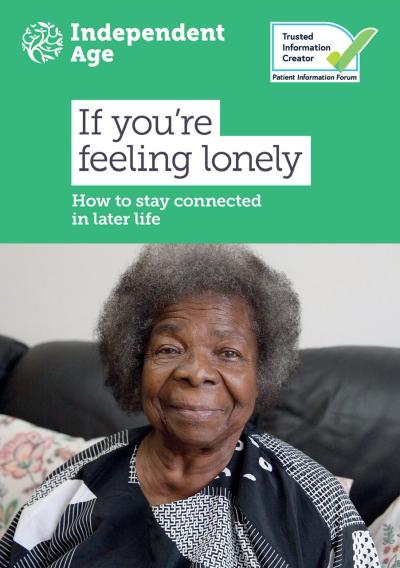Related publications

Staying connected to other people is good for your health and wellbeing. As you get older, you might find yourself with fewer day-to-day opportunities to meet others. However, there are practical things you can do to stay connected and lots of organisations to help you.
Having a network of good relationships improves your wellbeing and can keep your mind active. Staying connected with others and taking part in social activities can also increase your confidence and improve how you feel about yourself.
As you get older, certain changes can make it harder for you to stay socially active - for example:
It’s normal to find yourself alone at some points and being alone doesn’t always mean you’ll feel lonely. But not getting the quality or amount of social contact you want can lead to feelings of loneliness. This can affect your physical and mental health. For more information on loneliness, see our webpage on coping with loneliness.
Whether you want to stay in touch with old friends, make new friends or take part in social activities, a few simple steps can help you to get the social contact you would like.
While meeting people face to face is important, it might not always be easy to meet up as often as you’d like. Technology can help you stay in regular contact with friends and family, as well as giving you the opportunity to connect with new people.
Phone and video calls are a great way to stay in touch, especially if your friends or family live far away. You could schedule a call at a regular time every week so that you have something to look forward to. If it’s hard to arrange a time to call people, you could send letters, emails or text messages instead. You could also consider joining social media sites, so you can stay connected with everyone close to you.
If you don’t have someone close to keep in touch with, there are plenty of charities that offer friendly, regular chats. For example, Re-engage has a call companions service for older people who live alone and would like a friendly phone call every week or so, and Age UK offers in-person and telephone befriending schemes.
As well as helping you to keep connected with friends and family, the internet can be a great way to meet new friends or get back in touch with old ones. If you’ve fallen out of touch with friends, social networking sites like Facebook can be useful for reconnecting. Online forums can be a good way to find people with similar interests and chat with people across the UK and the world. For example, Gransnet (not just for grans) is an online social forum for anyone over 50. Charities like Royal Voluntary Service also hold activities that you can join online - for example, they offer a Virtual Village Hall where you can join in online sessions about arts and crafts, cooking, gardening and more.
Our Staying connected online webpage has more information about how to keep in touch with friends and family.
Joining a social group or taking part in an activity can help you to meet new people and make friends. It's also a great way to continue with your hobbies, learn skills and pick up new interests.
Do something you know you enjoy or try something new. You could:
It’s a good idea to plan ahead, and putting things in the diary or calendar can give you something to look forward to. Our guide If you're feeling lonely has more suggestions.
If you're living alone and you'd like to have regular company at home, you could consider being part of a homeshare scheme. These schemes, which are currently in England and Wales, work by matching an older person with a spare room with someone looking for more affordable housing who is happy to keep you company.
There are many benefits of living in a homeshare. It can:
For more information about homeshares, visit Homeshare UK.
Watch the video below to hear Cecil's story about his experience with homesharing.
(Video credit: Homeshare UK)
If you’d rather talk to someone who isn’t close to you, there are organisations that can help, such as:
There are lots of small, practical steps that can help you stay connected. Try some of the following suggestions.
Remember to look after yourself. Eating well, staying active and getting a good night’s sleep can help you relax, feel better and feel more like socialising with others.

Our guide If you're feeling lonely has more information about where you can find opportunities to meet people and get involved in activities.